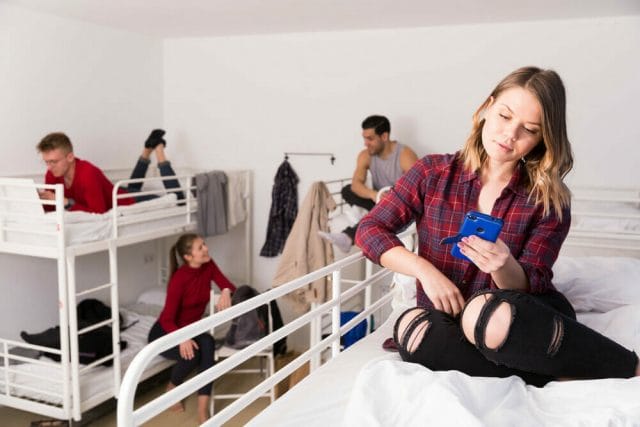The high-level income in the Land Down Under ensures good living standards. In any well-developed country with a high standard of living, the cost of living is usually higher compared to under-developed or developing nations.
Having a few extra bucks in your bank account to buy is always nice. It sure does come in handy to buy that Nike shoes you’ve been fancying, to explore different parts of Australia during holidays, or simply to feel good.
Here are few life hacks that will help you to minimize your expenses and save up big.
Save Money Like a Pro
The primary living costs in Australia include
- Accommodation
- Food
- Transport
- Utility
- Insurance
However, some other costs may also incur depending on lifestyles and individuals.
How To Save The Most on Your Rent?
Most of your money will be spent on rent, which may constitute half of your total expenses. Rental cost is variable based on location. Generally, the major cities like state capitals such as Sydney, Melbourne, etc. have higher rents compared to regional areas.
The main factor that drives this cost is the distance from the city centre. There are other determinants, for instance, the type of dwelling (apartment, studio, or house), and living arrangements.
Moreover, rents of houses and apartments within a walking distance to your college or university might also be a bit higher than the ones at a distance. Universities and colleges also provide in-house accommodation facilities with pricing based on categories of rooms.
The living arrangements you can choose from are:
- Live without sharing
- Get your own room with shared facilities
- Live in a shared room with shared facilities
Living Without Sharing
If you love your personal space and privacy, this is the best option for you. You can choose from three types of places to live in.
- An apartment
- A studio
- A house
Depending on the location an apartment or house is the most expensive rather than a studio. Living in a house all by yourself without sharing it with another tenant is quite expensive. You will have to pay the full rent of the dwelling to afford this expensive way. So we do not recommend this way of living if you want to save that buck.
Get Your Personal Room with Shared Facilities
Shared accommodation is usually the most common type among students and workers on temporary visas. You can rent a room and share the other amenities like a bathroom, kitchen, living area, dining area, lawn, etc. If you spend some extra cash, you can get an ensuite room with your personal washroom.
As you will have your own room, this living arrangement gives you the required privacy, and the opportunity to get to know people from different cultures. The cost is much lower than living without sharing.
Living in a Shared Room with Shared Facilities
This is the cheapest way of living. A shared room with other occupants while sharing the other common components as well is common among students on a budget, and backpackers. The price depends on the number of dwellers in a room, the higher the number, the lower the rent.
There are several types of occupancy capacity ranging from 2 persons in a room to 4 people in a room. Some backpacker hostels that charge rent by the night, have rooms with a capacity of 8 occupants.
Saving on accommodation costs is easy. Knowledge on the Real estate industry of the Australian city would help you a ton while planning to choose the city. You can look for the suburbs with the lowest rents and pick the one that fits best with your convenience needs. Moreover, living in a shared room is the best choice for those who want to retain the maximum out of their earnings.
You can find shared accommodation registered on Flatmates or Gumtree. These websites list private and shared rooms of all price ranges in all locations in Australia.

How To Save Rent Using Airbnb?
An easy way to earn some extra bucks is using Airbnb. You can rent a whole apartment or house from Real Estate, live in one room and enlist the rest of the dwelling on Airbnb for renting on daily or weekly basis.
This way you may earn more than the rent you have to pay for the whole property, and keep some profits to yourself. So why pay rent out of your pocket?
Spend Reasonably Your Meal- Recover Your Bank Balance!
Expenditure on food is the next big element of living costs after accommodation. An average person usually takes 3 main meals per day: breakfast, lunch, and dinner. Additionally, there may be additional food costs based on dietary needs and preferences.
Eating costs highly depend on the type and source of food, whether it is home-cooked or bought from a restaurant.
Yes, Eating-in Can Save A Ton!
The only component of living costs that one can have considerable control on, is expenditure on food. Preparing your meals by cooking at home is the cheapest way which cuts the costs by more than half. Here is a piece of million-dollar advice- “get yourself familiar with some culinary skills before coming to Australia”.
You also need to be careful about where you buy the ingredients from. Usually, big superstores like Woolworths, Coles, and Aldi sell groceries at much lower prices than other convenience stores. You may have a grocery shop right at your doorstep but be wise and walk that extra mile to find a Coles or Woolworths outlet to buy your cooking materials.

Why Should You Avoid Eating-out?
You may avoid the hassles of cooking simply by eating out at a restaurant. The average cost of a standard meal is about $10 in a mid-range restaurant or shop.
Try not to make it a regular habit if you want to see fat figures on your bank statement at the end of the month.
What About Snacks, Coffees, & Cravings?
In addition to regular meals, you may sometimes wish to grab a cold one with your mates, have some snacks, a cup of coffee, or have sudden cravings for a particular food item.
It is smart to keep a separate budget for this. A cup of coffee may cost from $3 to $5 depending on size and brand. Budget EVERYTHING!
Public Transport Every day, Keeps The Hardship Away!
The public transport system in Australia is state-of-the-art. Different state governments provide services of bus, train, light rail or tram, and ferry to make sure that people can travel for a reasonable fare. The best thing about public transport is that there is a maximum amount that can be charged per day and week regardless of how much you travel.
Know the areas you need to travel to and from every week on regular basis and check the cheapest mode of transport available to those areas. You can check the tariffs and plan your transport cost every week or month.
Most Australians prefer driving to work or school. If you travel frequently, driving may be a good alternative because it saves time and money. For people who do not travel often, commuting via public transport is the best choice.
Sometimes you may feel like calling a uber or a taxi to get to somewhere only because you are too lazy to walk for 2 minutes to the train station or the bus stop. That 2 minutes’ walk might bring a big smile on your face when you look at your bank balance at the end of the month.

Lower the Cost of Power!
Utility bills include energy costs such as electricity, gas, and water. Generally, the energy costs are included in the rent of shared dwellings, however, if you rent a whole apartment or house, you may have to pay for electricity and gas services every quarter based on usage. Water bills are typically paid by landlords.
Mobile and internet bills may also be considered utility expenses. Australian phone companies usually provide monthly mobile phone and internet plans for a fixed charge. You may also choose to go for the “Pay-As-You-Go (PAYG)” option in which you pay for what you use.
To get the best deal for utility services, know the prices offered by different companies and never hesitate to negotiate.
The Best Health Cover is the Cheapest One!
Every resident in Australia is required to have health insurance that covers basic hospital and emergency medical costs. If you are a temporary resident on either a student or work visa, you need to purchase health cover policies from private insurance companies. International students are required to have an Overseas Students Health Cover (OSHC) which covers hospitals, general physicians, and part of prescription drug costs.
The price of the policy depends on the cover, type of visa, and type of service. For example, if you want a basic insurance policy that will cover your hospital bills in emergencies, you will pay a minimum fee, whereas if you choose to pick a policy that covers a wide range of doctors and dentists, the price will be much higher.
Any medical cost that is not covered by the insurance company must be paid out of your wallet.
Before coming to Australia, you must purchase an OHSC for the entire duration of your student visa. There are different OSHC rates offered by insurance companies. Find out the best and cheapest OHSC to save some extra bucks.

Clutter Costs
In addition to the costs mentioned above, you should account for some other non-recurring expenses that may incur during your stay in Australia. You may get into an accident, lose your pair of glasses, lock yourself out of your apartment, or can get into any situation that might lead to spending some cash. Furthermore, you may incur some entertainment expenses such as going to the Cinema, trips, etc. It is wise to keep a fund for these emergency expenditures as a contingency plan.
Apply for International Scholarships
All tertiary education providers in Australia offer scholarship opportunities to international students. When applying for admission into a course, make sure you apply for the available scholarship option best suited for you even if you think you will not get it. There is no harm in trying!

Get Waiver Through Recognition of Prior Learning
Study the details of the course that you applied for and see if there are any units similar to the ones that you did before in another course. You can apply for Recognition of Prior Learning (RPL) and ask for the units that you completed before to be waived. This will substantially decrease your overall tuition fees.
Plan Your Budget
Managing expenditure to maximise savings is a form of art. Plan your expenses and make wise spending decisions so that you never have to struggle to survive in Australia. Saving petty amounts may add up to a big figure.
Planning your budget ensures proper governance of your financials. With a smart living cost plan, you can track your expenses and learn how to save better. Plan your expenses according to your income and “save for a rainy day”.
Always remember, “a penny saved is a penny earned” and this will always benefit you. It does not take much to make good savings, all you need is a few tricks up your sleeve.
What Are The Living Costs in Different Parts of Australia?
You should always plan ahead and know your expenses in the city of your university or college. Always move with a plan before arriving to Australia or any other country.
Let’s check out how costs differ in various major cities in Australia.
| City | Rent | Food | Transport | Utilities | Misc. | Total |
|---|---|---|---|---|---|---|
| Sydney (NSW) | $150 – $220 | $80 – $100 | $30 – $45 | $25 – $55 | $30 | $315 – $450 |
| Melbourne (VIC) | $120 – $200 | $80 – $100 | $25 – $50 | $25 – $55 | $30 | $280 – $435 |
| Canberra (ACT) | $100 – $180 | $80 – $100 | $20 – $40 | $30 – $60 | $30 | $260 – $410 |
| Brisbane (QLD) | $100 – $150 | $80 – $100 | $20 – $40 | $30 – $60 | $30 | $260 – $380 |
| Adelaide (SA) | $100- $150 | $80 – $100 | $20 – $40 | $40 – $70 | $30 | $270 – $390 |
| Perth (WA) | $100 – $150 | $80 – $100 | $15 – $45 | $40 – $65 | $30 | $265 – $390 |
| Darwin (NT) | $100 – $150 | $80 – $100 | $20 – $40 | $30 – $60 | $30 | $260 – $380 |
| Hobart (TAS) | $100 – $150 | $80 – $100 | $15 – $30 | $25 – $50 | $30 | $250 – $360 |
The costs stated above are the weekly minimum cost for a single individual living in shared accommodation away from the city centre. The food costs are based on home-cooked meals. Overseas Students Health Cover (OSHC) is not included as you will be required to pay it lump sum before arriving in Australia. There may be some establishment costs too, for example, rental bond payment, purchases of furniture, utensils, etc.
For couples, on average, an additional 40 to 50 percent of the total cost is required per week for the spouse.
Why Choose To Study in Australia?
Since you obviously want the best for yourself. Get a world-class qualification from a globally recognised institute saving big bucks on living costs and recovering the tuition fees working full-time during holidays? – then Australia is the right, if not the only country for you.
Contact us for more information on colleges and universities in Australia, the courses they offer, the tuition fees, living costs, and jobs in Australia.


